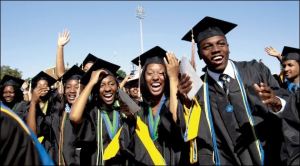Almost every poll about the state of race relations in the US indicates that White people believe things are getting better and Black people think things are getting worse. What accounts for these vastly divergent viewpoints? Why do White people see a glass half full and Black people question whether a glass even exists? Well, where I live one of the sites of divergence is in the material reality of life in our community. While my city is regularly lauded for being the number one place to live, 75 percent of Black children live at or below the federal poverty level. At the same moment, only 5 percent of White children live at or below poverty (and that includes those “temporarily” living in poverty by virtue of the fact that they are graduate students). In the nation 55 percent of our young men are graduating from high school while better than 80 percent of White young men graduate from high school. On every measure of quality of life, Black people are less likely to find themselves in a better situation than their White peers.
But, the divergent experiences of well-being are not just at the low end of the spectrum. When we look at what’s happening to middle class Black people we see that they too have a very different perspective on the state of race relations. Black middle class people still experience discrimination and exclusion in the work place and in civic and community life. They are rarely members of community or corporate boards which means they are not decision makers concerning local, state, or national issues. Those parents who think placing their children in suburban schools assures a quality education receive a rude awakening. The data suggest that Black children are more likely to be suspended and/or expelled in suburban schools than in urban schools. Their smaller numbers seems to place them under greater scrutiny and surveillance as they stand out in the sea of whiteness.
Black girls in suburban schools are especially isolated. They rarely receive invitations to parties or dates since their White classmates don’t ask them and increasingly Black boys don’t either. Instead, Black boys use their high social capital of being “cool,” “gangsta,” and “forbidden fruit” to woo their White classmates. Black girls rarely get chosen to be on the cheer leading or pom pom squads. They are almost never the homecoming queens. The stereotypes of them as “loud,” “rachet,” and “unattractive” leave them outside of the high school social scene.
Even on the college campus within the sacred halls of academe we see that things don’t seem to be “getting better.” My university has plenty of departments where there are NO Black faculty and often the Black faculty that are on campus are overworked because of the increased demand placed on them by students of color who need support. Often, Black faculty are not valued for their intellectual and scholarly contributions. One of my colleagues in the School of Music is one of the most eminent jazz musicians in the world. Last year he was named a National Endowment for the Arts Jazz Master…a singular honor that his White colleagues seem to dismiss. He has played with the world’s greatest musicians in the jazz, pop, and European classical music worlds. Not one of his colleagues has approached his stature yet they regularly dismiss his suggestions and attempt to contribute to the school.
Don’t get me wrong, being an academic is a privilege. It means you get to work on your passions and use your mind instead of the labor of your hands or your back. But even in the rare air of the ivory tower racism still exists. We still have to argue to bring additional students and scholars of color. People still mistakenly believe that any Black student on campus is “taking the spot” of a “deserving White person” they know. There is never any assumption of White mediocrity–only of Black people who are receiving a “free pass.” According to many Whites on our campuses these Black people don’t realize how good they have it and that the glass is half full. But, when I look at what’s really happening to Black people in the society I have to ask, “Wait, what…there’s a glass?”
Stay Black & Smart!









